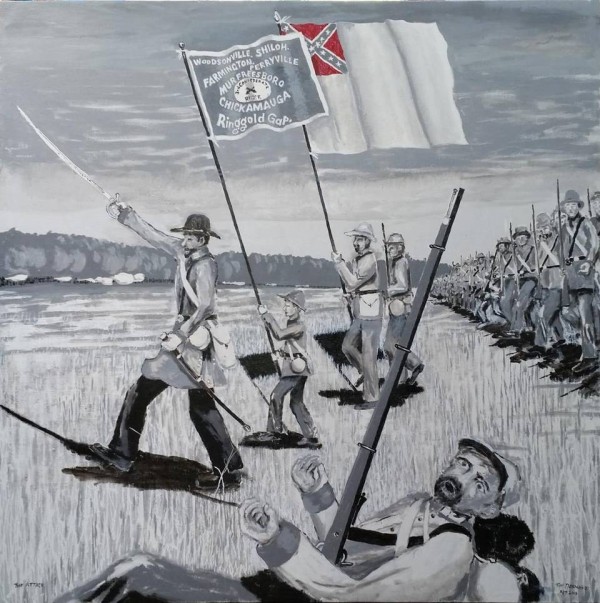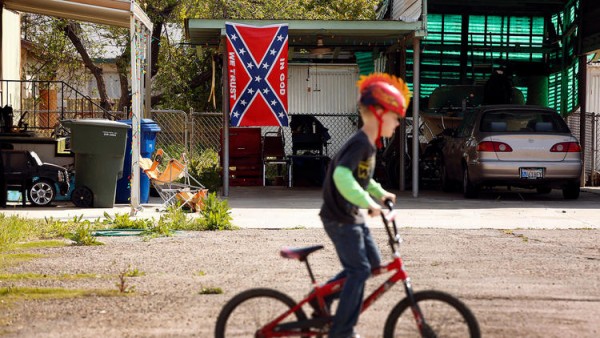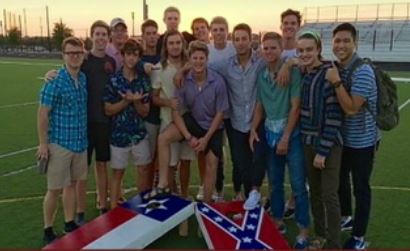CALIFORNIA: Fair Officials Ban Art Depicting Confederate Flag
FRESNO, Calif. — A Fresno artist is suing California state officials, accusing them of violating his free speech rights by keeping his Civil War painting that shows a soldier holding a Confederate flag from being exhibited at The Big Fresno Fair last year.
Timothy J. Desmond’s lawsuit in U.S. District Court in Fresno is the first legal challenge to a law signed by Gov. Jerry Brown in September 2014 that bans displaying the Confederate flag on state property, said Terry Pell, president of the Center for Individual Rights, a nonprofit public interest law firm in Washington, D.C., that is representing Desmond.

Fresno artist Timothy J. Desmond’s painting, “The Attack,” which depicted a Civil War battle from the Siege on Atlanta in 1864 in which one of the soldiers is carrying a Confederate flag. Center for Individual Rights in Washington, D.C.
Desmond, 70 and a retired high school science teacher, has sued Attorney General Kamala Harris, Food and Agriculture Secretary Karen Ross, Fairs and Expositions chief John Quiroz and Big Fresno Fair CEO John Alkire for violating his constitutional rights.
The lawsuit says Desmond is a Civil War buff who created a painting called “The Attack,” which depicts Confederate soldiers fighting in the 1864 siege of Atlanta. The Big Fresno Fair banned the painting because a soldier in the painting is carrying a Confederate flag into battle, Pell said.
At issue is California Government Code Section 8195, which says that the Battle Flag of the Confederacy, also referred to as the Stars and Bars, or any similar image cannot be sold or displayed on state property unless the image appears in a book, digital medium or state museum that serves an educational or historical purpose.
State officials and Alkire used the law to ban Desmond’s painting at the state-run Fresno Fair, the lawsuit says.
The California Legislature adopted the law because it disapproved of the views that sometimes are associated with the Confederate flag, the lawsuit says.
But Desmond and his lawyers say in court papers that the law should not apply to privately created artworks displayed at state-run fairs. They said the code section would have a “chilling effect” because it prohibits or threatens to prohibit individuals’ constitutionally protected speech.
For example, the code section would bar people from placing the Stars and Bars flag on a Confederate veteran buried in a state cemetery. The section also would bar a student in a state-funded school from displaying a Confederate flag in a history project.
While state officials have latitude to restrict the state’s own speech, Pell said the First Amendment limits the state’s authority to prohibit private individuals from displaying the Confederate flag in circumstances like an art show, where it is clear that the state is not endorsing the content or message of any of the paintings displayed by individual artists.
“It’s one thing to ban the Confederate flag from flying over the state Capitol,” Pell said. “Applying it to individual artists goes beyond the intent of the code section.”
Desmond wants a federal judge to declare the law unconstitutional “on its face as over broad under the First Amendment of the U.S. Constitution.” He also wants a judge to prohibit the defendants from enforcing the law against other artists.
Because Desmond wants to show his painting at The Big Fresno Fair in October, Pell said his nonprofit plans to file for an injunction soon in federal court.
“We believe it is a strong and important case,” said Pell, adding that his nonprofit is dedicated to the defense of individual liberties “against the increasingly aggressive and unchecked authority of federal and state governments.”
The attorney general’s office declined to comment on whether the lawsuit has merit, other than to say it is reviewing Desmond’s complaint.
Alkire said in an email: “Yes, we are aware of the lawsuit. However, it is the practice of The Big Fresno Fair to not comment on any current or pending litigation.”
Desmond grew up in Madera, studied painting at California College of Arts and Crafts in Oakland and earned a bachelor’s degree in zoology from Fresno State. He taught high school biology, chemistry and physics in Madera and Firebaugh. He also has written many books that revolve around conspiracies and other theories, according to his profile on Amazon.
Every year, The Big Fresno Fair displays artwork, including photographs and paintings from local artists. “In using its property to show paintings, the Big Fresno Fair has created a public forum for such works,” the lawsuit says.
In 1995, Desmond won first place in the developing artist category for a piece called “Don’t Miss It, Don’t Even Be Late.”
Before Desmond submitted “The Attack” for the 2015 Big Fresno Fair, the lawsuit says, Quiroz instructed Alkire to contact the attorney general’s office for a legal determination on whether Section 8195 applied to Desmond’s painting.
The lawsuit says Alkire contacted the attorney general’s office and was told it would be unlawful to display the painting at the fair. “As the Attorney General, defendant Harris made that determination,” the lawsuit says.
–fresnobee.com
###
CALIFORNIA: Ban on Confederate Flag Goes To Absurd Extreme
When California legislators passed a law two years ago banning state government from selling or displaying Confederate flags, the measure seemed silly and not particularly meaningful.

A confederate flag is flown on a home along Beardsley Avenue in the Oildale, an unincorporated community in Kern County, on March 15. (Los Angeles Times)
The ancient and offensive battle flag of the Confederacy was not flown regularly, if ever, on state property. And why would it have been? But the Capitol gift shop was selling replica Civil War-era money depicting images of the Stars and Bars that was offensive to at least one lawmaker’s mother. More significantly, legislators said a ban would send a powerful message that California has no tolerance for racist images used to perpetuate bigotry and violence.
If the law by Sen. Isadore Hall III (D-Compton) seemed innocuous then, that’s because people didn’t foresee all the ways it might be used. And now we have one disturbing example of its unintended consequences, courtesy of the Fresno County fair.
This is an absurd application of a law that was not intended — at least not ostensibly — to police artistic expression or speech in a public forum such as the fair’s art show. Worse, it sets a dangerous precedent. How might this be interpreted for school art projects or works displayed in a library? The law specifically exempts books, works in museums and digital documents for historical or educational purposes, but not art in other forums. That’s nuts.
It also defies common sense. The state has every right to decide not to hang up Confederate flags in its own house. But extending that ban to individuals’ creative expressions is an ill-considered — and possibly unconstitutional — leap. Desmond is suing fair and state officials in federal court (the fair is state operated). We hope the state officials decide not to spend time or money to defend this attack on Desmond’s 1st Amendment right to paint Civil War scenes as he sees fit.
–losangelestimes.com
###
TEXAS: Students Playing Cornhole WIth Confederate Flag Board Face Backlash
TROPHY CLUB, Texas – A group of students who played a game of cornhole at Byron Nelson High School in Trophy Club is facing backlash after one of the boards used was decorated with a confederate flag.
A photo of some students posing with the board was shared on social media. Then other students who were offended complained.
Almost all of the senior students have apologized in some way on Twitter, where much of the discourse among students on this issue played out.
Seniors stood on the field at Byron Nelson Bobcat Stadium, proudly surrounding a cornhole set — one painted in the Texas flag and the other in the confederate flag.
Some say the flag is a symbol of Southern heritage. Others believe it stands for slavery.
The school district got complaints almost immediately from a parent and several students. School principals sat down with those concerned as well as the seniors pictured.
“That wasn’t even the first thought to them, that it could be something like that,” said Northwest ISD spokesperson Emily Conklin. “They just seemed surprised that that would be taken that way.”
Northwest ISD Spokesperson Emily Conklin says a student brought the set to Senior Sunrise, a school tradition that happens each year before school hours.



